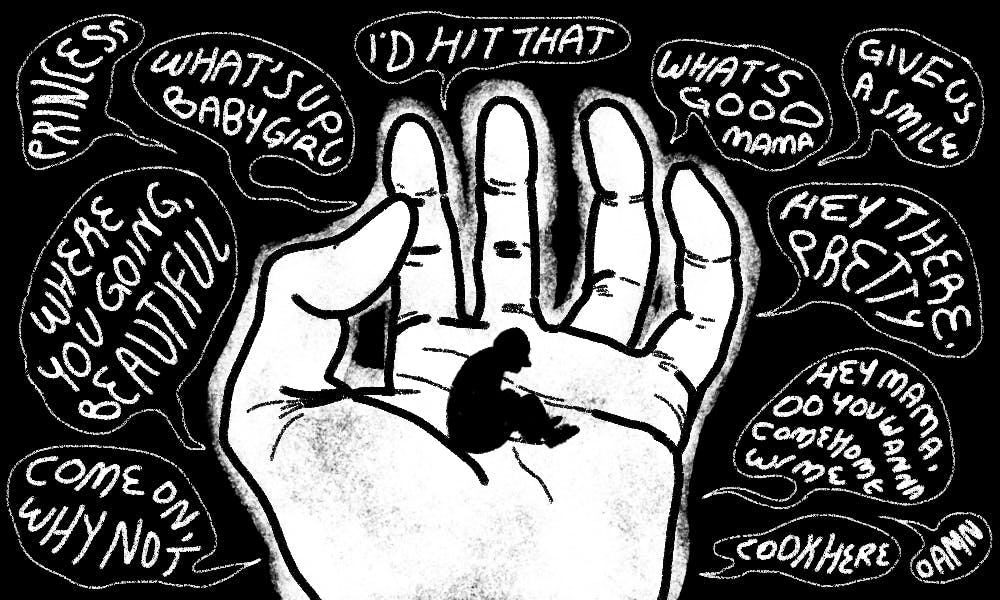When I leave my apartment to go somewhere at night, I check my reflection in the mirror twice. Once simply to make sure my shirt is buttoned up correctly or to smooth down a flyaway hair, and the next to ask myself a question: Is this outfit going to make me a target?
I didn’t ask myself this much before — but something has changed. I’ve run outside to get food, clad in shorts and a T-shirt, and have been met with crude comments and the ogling eyes of men on the street. Walking to meet my friends for dinner, I’ve drowned out the noises of a deep voice saying he wished that he could take me home. The sexually-charged jeers and chidings are something that many women eventually become desensitized to — myself included. Just keep walking, you tell yourself, pulling your coat a little tighter around your arms. This year, the sporadic street catcalls and harassment that I always brushed off in the past began to eat away at me. I’ve come to consider this area my second home, but the lingering feeling of vulnerability I experience in my own body has instilled within me a new sense of fear. I felt that it was time to reclaim the confidence I was beginning to lose.

My countless run-ins with verbal harassment in the Philadelphia area has varied between mildly annoying and frightening to the point where I have had police officers file into my apartment after a 911 call made on my way home from Center City. The effect of these encounters, though, is largely the same. I leave with a sense of dehumanization manifesting as a heavy pit in my stomach; the remarks that fly from their mouths with such little regard make it clear that I am nothing more than a body to them. I reached a turning point in my response to being sexually harassed when I realized that my fear and disgust was not enough to repel the men who taunted me. Though I often browse Amazon for pepper spray or brass knuckles, the little voice in my head persists: Would I ever actually use any of these things? Usually when I see a man coming toward me on a dark street, I am simply afraid. He is a stranger and I do not know what he is capable of. Though fear is my visceral reaction — and when met with the impulse of fight-or-flight I have only ever fled — anger quickly follows suit.
I do not find solace in knowing that I am not alone. 77 percent of women across the United States have reported experiences of verbal sexual harassment, 51 percent of unwelcome sexual touching. When these encounters are perpetrated by strange men on public streets, a feeling of powerlessness often takes its toll. In the moment that it happens, I am usually too disturbed or frightened to say or do anything other than use the adrenaline coursing through my body to walk more quickly toward my destination. Though my anger is always directed toward the harasser, I have found myself increasingly aggravated with myself for not doing more to prevent the verbal, and one time physical, attacks. This is why these events have been playing and replaying in my mind lately — I wonder if there is something I could have done or can do differently to avoid being violated.
A few months ago I began to do what I thought were the only things in my power to stop being subjected to sexual harassment on the streets of Philadelphia. Every time I went out alone at night, I got on the phone with somebody and kept my eyes toward the ground. Instead of choosing comfort or style, I buried myself in heavy sweatshirts and sweatpants. Doing this impacted me mentally and emotionally, because I am typically somebody who relishes in the extremes: loud laughter, intricate makeup, and the flashy, bold clothing that I have loved since I was a little girl — but I was willing to make myself invisible if it meant that I would be left alone. Still I asked myself, was there more that I could do?
The conclusion that I have come to is less of an answer than it is a reminder: It is not my fault. It is not my fault for walking outside wearing shorts in August or a form-fitting dress in December. I cannot blame myself or my body for the reprehensible comments that are thrown toward me without respect or a second thought. I will not curse myself for walking away in the name of my own safety. The only cowards in these situations are the individuals who try to grasp at a sense of control by slinging verbal attacks at women. If you have or are experiencing this, remember that you are stronger than any of their words may ever make you feel.

ISAMI MCCOWAN is a College sophomore from Durham, N.C. studying Politics, Philosophy, and Economics. Her email address is isami@sas.upenn.edu.









